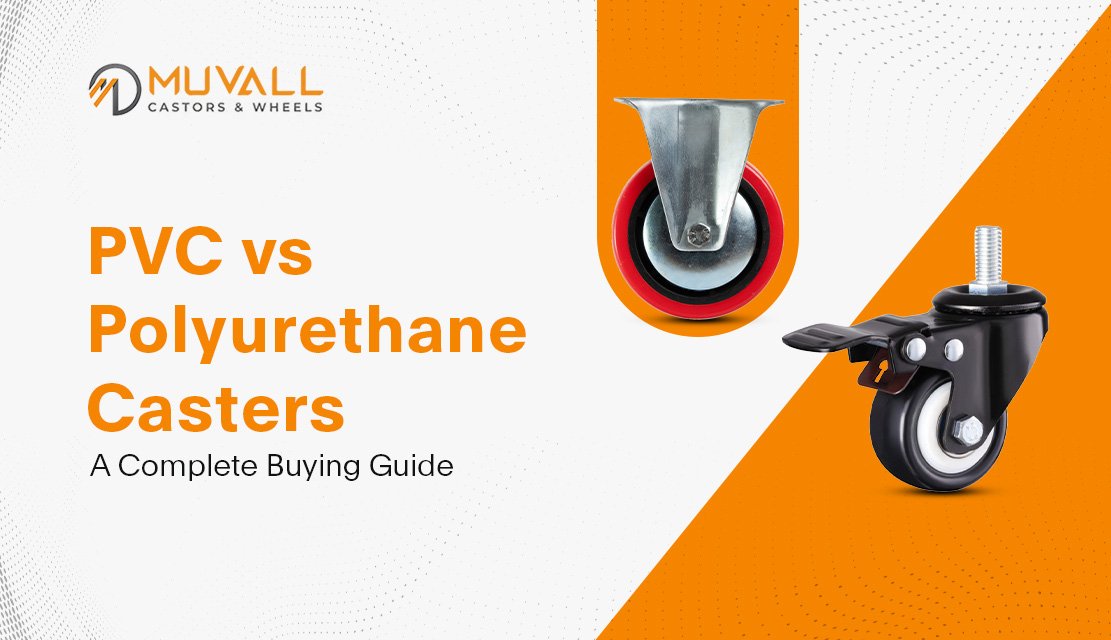
Choosing between PVC and polyurethane casters is important in many industries because it affects strength, movement and floor protection. This blog explains the differences, benefits and drawbacks of both these materials. Continue reading the blog for expert tips on which one to pick for different types of flooring.
PVC, or Polyvinyl Chloride, is a common and flexible plastic used in many industries. Since it is known for being strong and affordable, it can be used in a variety of products. Casters made of PVC are called PVC caster wheels.
Best flooring types: Great for carpeted or tiled floors with light load needs.
Polyurethane is a strong and flexible material used in many industries because of its great qualities. It is a type of plastic made from organic compounds connected by urethane links. These links can be adjusted to create different strengths and features.
Polyurethane is a popular choice for making caster wheels due to its unique properties. The casters made using polyurethane material are called PU caster wheels.
Best flooring types: Ideal for hardwood, industrial floors and surfaces where durability and strength are important.
Also Read: Neoprene vs. Polyurethane Casters: Choosing the Right Wheel for Your Application
It is important to know how much each material works in different situations when deciding between PVC and polyurethane casters. This comparison focuses on the main differences between the two to help you choose the best option for your needs:
PVC casters: They are best for light to medium loads and work well for equipment that is not too heavy. PVC casters are not as long-lasting as polyurethane and can wear out faster with regular use, especially in industrial environments.
Polyurethane casters: PU casters are made for heavy-duty use and can handle heavier loads without losing shape. Since they last much longer, they are a better option for equipment that is moved often or carries heavy loads.
PVC casters: PVC resists chemicals well. It makes them a good choice for environments with acids, alcohols or alkalis. However, PVC wheels do not handle high temperatures very well.
Polyurethane casters: Polyurethane is very durable and resistant to wear and damage. It makes them great for rough surfaces or outdoor use. However, the wheels can be affected by certain chemicals and solvents.
PVC casters: They are usually cheaper. This makes them a good option for light-duty tasks. Simply put, PVC caster wheels are a cost-effective choice for short-term use or when you need to stick to a budget.
Polyurethane casters: While more expensive, PU casters offer better long-term value. That is because they last longer and are more versatile. They are a smart investment for heavy-duty use or when long-lasting performance is needed.
PVC casters: They work well on carpets and tiles but can leave marks or scratches on hardwood or Epoxy floors. It means these casters are not the best choice when protecting the floor is important.
Polyurethane casters: PU caster wheels are gentler on floors and are less likely to leave marks or scratches. This makes them great for a variety of floor types, including epoxy, hardwood and more delicate surfaces.
PVC casters: These casters can be louder when rolling, especially on hard floors. This could be a problem in places like hospitals or offices where quiet is important.
Polyurethane casters: PU casters are usually quiet and smoother. This makes them better for noise-sensitive areas. Moreover, their shock-absorbing design also makes them more comfortable to use.
Suggested Read: Polyurethane Vs Polypropylene Wheels: The Right Choice For Industrial Caster Wheels
Choosing the right caster is important for the best performance and long life of your equipment. PVC is great for light-duty tasks and budget-friendly options, while polyurethane is better for heavy-duty jobs and protecting floors.
Consider factors like floor type, load capacity and the environment to make the right choice. Feel free to get expert advice and high-quality caster wheels from Muvall. Reach out today for a solution that is perfect for you!
Ans. Consider the weight of the equipment and the type of floor it will be used on. PVC casters are ideal for lighter loads and smooth indoor floors, while polyurethane casters are better for heavy-duty tasks and protecting floors like epoxy or hardwood.
Ans. PVC casters are ideal for indoor settings like carpeted or tiled floors. As a result, they may not perform well on rough or outdoor surfaces due to their lower durability and heat resistance.
Ans. While PU casters are durable and resistant to wear, they can be sensitive to extreme temperatures. Therefore, if high heat is a concern, it is important to select casters specifically designed to withstand such conditions.